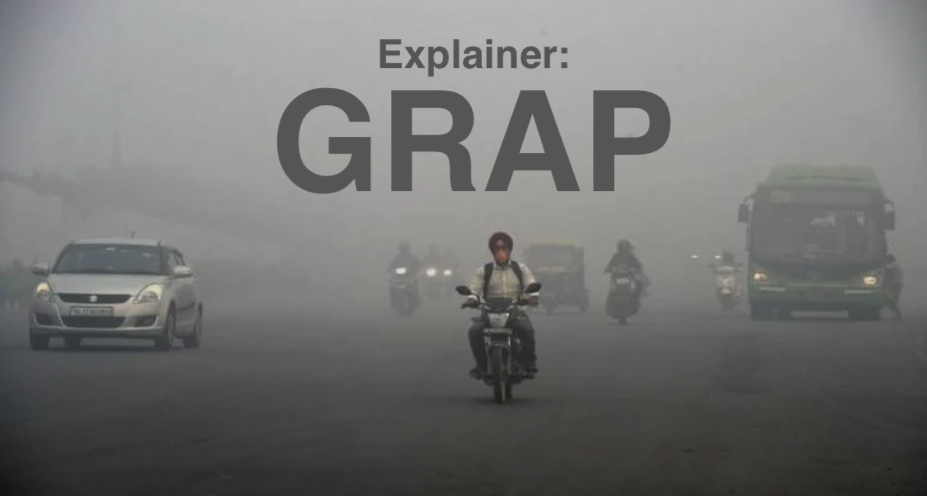Syllabus:
GS-3: Conservation, environmental pollution and degradation, environmental impact assessment
Context:
Recently, in view of deteriorating air quality levels in the National Capital Region (NCR), the Commission for Air Quality Management in National Capital Region and Adjoining Areas (CAQM) on Tuesday invoked Stage-I of the Graded Response Action Plan (GRAP) with immediate effect.
More on the News
- The decision came after Delhi’s daily average Air Quality Index (AQI) was recorded at 211, falling in the ‘Poor’ category, as per the Central Pollution Control Board (CPCB).
Key Measures
The 27-point action plan under Stage-I of the Graded Response Action Plan (GRAP) addresses key sectors to mitigate pollution effectively:
- Dust Control: Enforce stringent dust suppression protocols at construction and demolition sites, including mandatory anti-smog guns, consistent water sprinkling, and mechanized street cleaning.
- Solid Waste Management: Ensure systematic collection and scientific disposal of municipal solid waste, construction debris, and industrial refuse to prevent open dumping and reduce pollution sources.
- Traffic Management: Deploy traffic police at congestion points, rigorously enforce Pollution Under Control (PUC) certifications, impound visibly polluting vehicles, and redirect non-essential trucks via designated peripheral expressways.
- Industrial Regulation: Shut down non-compliant industrial units, mandate the use of approved clean fuels in industries and brick kilns, and enforce emission standards at thermal power plants.
- Ban on Polluting Fuels: Prohibit the use of coal and firewood in hotels, eateries, and open kitchens, promoting cleaner fuel alternatives to limit air contaminants.
- Firecracker Ban: Implement judicial orders prohibiting firecracker use during festivals to control episodic pollution spikes.
- Public Communication: Provide real-time air quality updates through social media, mobile applications, and bulk SMS, and facilitate prompt resolution of citizen complaints via digital platforms.
Graded Response Action Plan (GRAP)
- Graded Response Action Plan is an emergency air pollution control plan for the Delhi-NCR region that is triggered by worsening air quality.
- The Commission for Air Quality Management (CAQM) is responsible for its implementation.
- The GRAP was approved by the Supreme Court in 2016 and first notified by the Ministry of Environment, Forest and Climate Change (MoEFCC) in 2017.
- It is a four-stage, science-based framework that implements progressively stricter measures based on the Air Quality Index (AQI) level, ranging from “Poor” to “Severe+”. The four stages are as follow:
- Stage I (Poor: AQI 201–300): Activated when AQI falls within 201–300, this stage enforces stricter dust control at construction sites and increases public transport frequency to reduce vehicular emissions.
- Stage II (Very Poor: AQI 301–400): Triggered at AQI levels between 301–400, this stage continues all prior measures and adds further restrictions to curb pollution levels.
- Stage III (Severe: AQI 401–450): When AQI reaches 401–450, more rigorous actions are implemented, including shutting down brick kilns and pausing industrial operations that contribute substantially to pollution.
- Stage IV (Severe +: AQI > 450): The most critical stage, activated above AQI 450, involves bans on non-essential truck movement and BS-IV diesel vehicles, halting construction activities, and advising work-from-home to minimize exposure and emissions.
Commission for Air Quality Management (CAQM)
- The CAQM was established in October 2020 by an ordinance and later became a statutory body through the CAQM Act of 2021.
- It replaced the Environment Pollution (Prevention and Control) Authority (EPCA) to address air pollution in the National Capital Region (NCR) and adjoining areas.
- Its goal is to coordinate and implement measures for improving air quality in the NCR and surrounding states.
Central Pollution Control Board (CPCB)
- The CPCB is a statutory body established under the Water (Prevention and Control of Pollution) Act, 1974.
- The CPCB provides technical services to the Ministry of Environment and Forests.
- The CPCB also promotes cleanliness of streams and wells in different areas of the states by prevention, control and abatement of water pollution.

